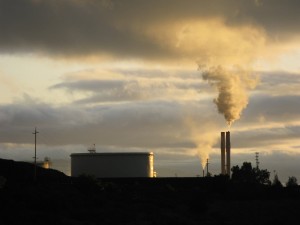The industry, and its allies in Congress, quickly dismissed that conclusion.
Sen. Joe Manchin, D-W.Va., said the agency was holding the coal industry to "impossible standards."
"If these regulations to into effect," he said, "American jobs will be lost, electricity prices will soar and economic uncertainty will grow."
EPA administrator Gina McCarthy said in a speech Friday that rather than damage an industry, the proposed regulations would help the industry to adapt, by encouraging energy companies to develop ways to reduce carbon dioxide, the chief greenhouse gas, from burning coal.
"This proposal, rather than killing future coal, actually sets up a certain pathway forward for coal to continue to be part of the diverse mix in this country," McCarthy said. "We know that coal is going to be part of the energy generation that we rely on substantially over the next few decades. Why wouldn't we now acknowledge and invest in the kind of technologies that will allow coal a future long beyond that?"
McCarthy pressed her case by linking global warming to environmental problems that include severe weather, disease and worsening of other types of air pollution.
"We know this is not just about melting glaciers," McCarthy said. "Climate change — caused by carbon pollution — is one of the most significant public health threats of our time."
Despite some tweaks, the rule packs the same punch as one announced last year, which received more than 2.5 million comments and was legally vulnerable because it required coal and natural gas to meet the same limit.
Coal and natural gas now have separate standards, but the effect is the same: New coal-fired power plants will need to install expensive technology to capture between 30 and 50 percent of their carbon dioxide and bury it underground. No coal-fired power plant has done that yet, in large part because of the cost. Virtually all new natural gas standards would meet the standard without additional controls.
The EPA's own analysis says that a new natural gas-fired plant would cost $891 per kilowatt hour. But a new coal plant built to meet the standard would cost between $3,274 and $3,301 per kilowatt hour.
Environmental groups praised the proposal for taking action against the largest remaining uncontrolled source of greenhouse gas pollution. That pollution, the EPA said Friday, is worsening air quality, water quality, disease and contributing to more severe weather.
"Big polluters have been getting a free ride for decades, while Americans foot the bill in the form of asthma attacks, respiratory illness, floods, wildfires and superstorms," said Michael Brune, executive director of the Sierra Club.
The regulations have been in the works since 2011 and stem from a 1970 law passed by Congress to control air pollution. In 2007, the Supreme Court ruled that that law, the Clean Air Act, could be applied to heat-trapping pollution. The EPA already has issued rules aimed at curbing global warming pollution from automobiles and the largest industrial sources.
Coal was already struggling to compete with cheaper natural gas. It now accounts for about 40 percent of U.S. electricity, a share that was already shrinking.
The EPA pointed to four coal-fired power plants under development — in Texas, Mississippi, California and Saskatchewan, Canada — to show that the rule is possible to meet.
Yet one of the companies behind those plants, Southern Co., said Friday that its Kemper County Energy Facility in Mississippi "cannot be consistently replicated on a national scale." The facility, scheduled to open in May 2014, is located close to low-cost lignite coal. It is also adjacent to an oil field, where the carbon dioxide will be injected to produce more oil.
The company also has received hundreds of millions of dollars in federal grants and tax credits to offset the cost.
The revised standards, the company said in a statement, "essentially eliminate coal as a future generation option."
